Module 3: Orem’s Self-Care Deficit Nursing Theory – Flashcards
Unlock all answers in this set
Unlock answersquestion
List the 3 main theories within the *self-care deficit nursing theory*.
answer
1. The theory of *self-care* 2. The theory of *self-care deficit* 3. The theory of *nursing systems*
question
What are the 3 central concepts in the *theory of self-care*?
answer
1. Self-care 2. Self-care requisites 3. Self-care agency
question
Self-care
answer
The practice of activities that individuals initiate and perform on their own behalf in maintaining life, health and well being
question
TRUE or FALSE: Self-care cannot develop.
answer
True
question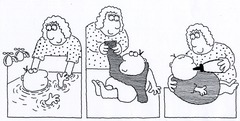
Dependent care

answer
The care that is provided to a person who is unable to perform the self-care needed to maintain life and well-being
question
TRUE or FALSE: Self-care cannot be performed if abilities could not develop, or became inoperable.
answer
True
question
Self-care agency
answer
An ability to engage in self-care that develops from childhood, reaches maturity in adulthood, and declines with old age.
question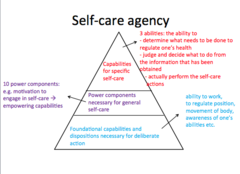
In the self-care agency pyramid what are the 3 tiers?

answer
1. *Capabilities* for specific self-care 2. *Power component* necessary for general self-care 3. Foundational *capabilities and dispositions* necessary for deliberate action
question
In the first tier of the self-care agency pyramid, what are the *3 abilities for specific self-care*?
answer
1. *Determine* what *needs* to be done to regulate one's health 2. *Judge and decided* what to do from the info that has been obtained 3. *Actually perform* the self-care actions
question
Motivation to engage in self-care and empowering capabilities is an example of what part of the self-care agency pyramid?
answer
Power components
question
Give examples of *foundational capabilities and dispositions necessary for deliberate action*.
answer
-ability to work -to regulate position -movement of body -awareness of one's abilities
question
Dependent-care Agency
answer
The acquired ability of a person to know and meet the therapeutic self-care demand of the dependent person
question
What are the *3 self-care requisites*?
answer
1. Universal -all humans throughout all stages of life cycles 2. Developmental -2 types: maturational and situational 3. Health - deviation -for individuals who are ill, injured or disabled
question
In the self-care requisite "developmental", explain the difference between *maturational and situational self-care*.
answer
*Maturational*: related to universals, but adjusted for age or developmental stage (eg. needs for food and interaction in adulthood are different from those of a neonate) *Situational*: Prevents of overcomes effects of life events or experiences that can impact human development (eg. tragedy of death, change of residence, experiences related to social conditions like educational deprivation)
question
What are the *8 universal self-care requisites*?
answer
1. Maintenance of a sufficient intake of *air*. 2. Maintenance of a sufficient intake of *food*. 3. Maintenance of a sufficient intake of *water*. 4. Provision of care associated with *elemination* processes and excrements. 5.Maintenance of balance between *activity and rest* 6.Maintenance of balance between *solitude and social interaction*. 7.*Prevention of hazards* to human life, human functioning, and human well-being. 8. Promotion of human functioning and development within *social groups* in accordance with human potential, known human limitations, and the human desire *to be normal*.
question
What are the 3 *developmental self-care requisites*?
answer
1. Provision of conditions that promote development 2. Engagement in self-development 3. Prevention of or overcoming effects of human conditions and life situations that can adversely affect human development
question
A person deliberately drinks a quantity of water to maintain a sufficient intake of water. This is an example of what?
answer
Basic self-care requisite
question
What is a similarity between self-care and dependent-care?
answer
-they are both performed "purposively" (not instinctive, but performed rationally)
question
According to the *theory of self-care deficit*, when and why do people require the health service nursing?
answer
From time to time when individuals are affected by limitations that do not allow them to meet their self-care needs
question
What is the main idea of *theory of nursing system*?
answer
Nurses have abilities that they use to determine if nursing help is necessary or "legitimate"
question
Explain the *process of the theory of nursing system*.
answer
1. Determine existing or potential deficit relationship between abilities and demands for action (eg. health of an individual) 2. If deficit exits, design a plan -identify what is to be done and by whom (the nure, the pt, the family member) 3. Increase pt's capabilities to meet a need, or requisite, or to decrease the demand
question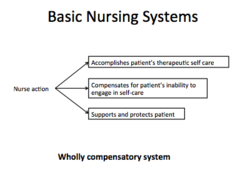
In basic nursing systems, identify the nurses actions in the *Wholly compensatory system*.

answer
-accomplishes pt's therapeutic self-care -compensate for pt's inability to engage in self-care -supports and protects pt
question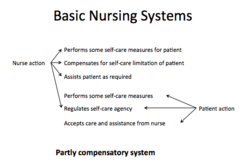
In basic nursing systems, identify the nurses actions in the *Partly compensatory system*.

answer
-perform some self-care measures for pt -compensate for self-care limitation of pt -assist pt as required -perform some self-care measures -regulate self-care agency
question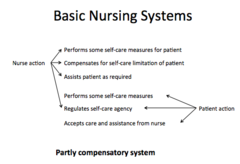
In basic nursing systems, identify the *patients* actions in the *Partly compensatory system*.

answer
- perform some self-care measures -regulate self-care agency -accept care and assistance from nurse
question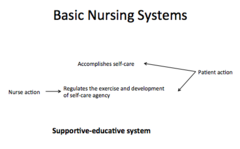
In basic nursing systems, identify the nurses action in the *supportive-education system*

answer
-regulates the exercise and development of self-care agency
question
In basic nursing system, identify the *patient* action in the *supportive-education system*.
answer
-accomplishes self-care -regulates the exercise and development of self-care agency
question
What is the difference between self-care activities and actions?
answer
The timely dimension: self-care *activities* are actions that are just carried out (or were just carried out), whereas self-care requisites circumscribe intended *actions* that should be or must be carried out.
question
Explain the patient's view about nursing in relation to Orem's theory.
answer
Orem described humans who have a self-care deficit and who are not able to adequately meet their self-care demands as "legitimate" pts.
question
What is the *overall aim of nursing*?
answer
-helping humans in maintaining structural, functional integrity and well-being during the road to independence -If independence not possible: nurses should support relatives or others to assume responsibility for the self-care of the pt
question
TRUE or FALSE: Nursing is a intellectual, diagnostic process and complementary method.
answer
True: It complements actions of humans (or their relatives) who are not able to perform the necessary self-care
question
What is the main thesis of Orem's theory?
answer
At times human beings are are not able to perform actions that promote or maintain life, health and well-being. Nursing has the responsibility to compensate for these deficits with the aim to assist these human beings (or their relatives) to regain these abilities (as much as possible).
question
Explain the *worldview* of Orem's theory.
answer
-humans are rational, problem oriented beings who want to satisfy their needs -nature consists of universal pattern (norms) -social reality is defined by roles related to different social positions (responsibilities and obligations)
question
Is Orem's theory normative or descriptive?
answer
Normative: it defines on what nurses should focus (eg. for whom nurses should care)
question
What are some challenges to Orem's theory?
answer
-The theory neglects mental, psychological or social adaptations necessary for humans confronting serious illness, impairment or disability -Does not account for nursing care situations in which self-care deficit is not the core problem: suffering, pain or mourning
question
What are the *two central criticisms* to Orem's SCDNT?
answer
-The concept of action is limited and is extremely problematic due to the system theoretical frame of the theory construction -The practical consequences promote an expertocratic exertion of power of nurses over patients
question
According to Parsons' how is action understood?
answer
A selection against the backdrop of goals, means and situational contexts whereby this selection is lead by societal norms. -limited to instrumental action
question
Explain 2 outcomes of Parson's model following Orem's.
answer
-a conception of action that is primary oriented toward the individual actions are not directed towards communicative understanding -the singular orientation of action is caught in a utilitarian concept of action it is difficult to perceive how one can get from 'unit acts' to 'social acts'.
question
System Theoretical Frame
answer
*System theoretical frame*: the basic unit of a social system is the individual, but it is embedded in role pattern and institutional structures.



